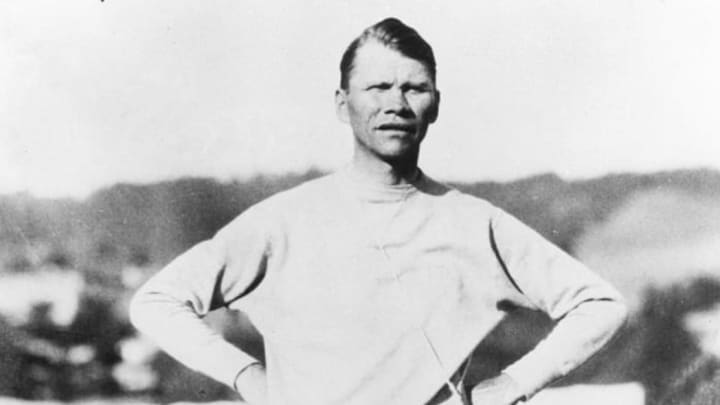Top 50 Cal Sports Moments -- No. 7: Andy's Death, 1926

As the Pac-12 Conference era comes to a close after more than a century, we count down the Top 50 moments involving Cal athletics.
THE MOMENT: At 6 a.m. on Friday, January 8, 1926, Cal football coach Andy Smith died in Philadelphia at the age of 42 as the result of a pulmonary abscess following bronchial pneumonia. Cal’s reputation as the best college football program in the country died with him.
THE STORY: Andy Smith was hired as head coach in 1916 to start a football program where none existed. The 1915 season was the first in which Cal had returned to playing football instead of rugby, and that season was a wash because the coach was still the rugby coach. So Smith, then 36 years old, was basically starting from scratch.
By his fifth season, Smith had built Cal into the best football program on the West Coast, and one of the best in the nation. The Bears went unbeaten for five consecutive seasons from 1920 through 1924, and were named national champions by at least one reputable body in each of the first four of those seasons. Smith’s Bears established West Coast football relevance when his squad squashed favored Ohio State in the 1921 Rose Bowl, and that Cal team is considered one of the best college teams in history. Cal tied Washington & Jefferson in the 1922 Rose Bowl, and Smith declined offers to play in the next two Rose Bowls (then known as the Tournament East West football game) because of his complaints about the eligibility of the Washington & Jefferson players.
Highlights of Cal’s Wonder team below, although the narrator says the Cal coach was the “legendary Al Smith.” Al Smith was a New York governor and Democratic candidate for the presidency in 1928.
The Bears’ 50-game unbeaten streak ended with a 15-0 loss to the Olympic Club in the third game of the 1925 season, and the Bears also lost their final two games of the season against Washington and Stanford. It was about the time Cal lost to Washington on November 15 that Smith was diagnosed with cold-like symptoms that prompted his doctor to tell Smith to rest. Instead Smith prepared his team for the November 21 game against Stanford, which Cal lost 27-14. Nonetheless that 6-3 season did little to diminish optimism that Cal would return to national dominance in 2016.
The day after the loss to Stanford, Smith boarded a train headed for Philadelphia so he could attend the November 26, Thanksgiving Day game between his alma mater, Penn, and archrival Cornell, a game Penn won 7-0 on the Quakers' home field. The next day Smith journeyed to New York, so he could witness the Saturday, November 28 Army-Navy game at the Polo Grounds. It was during that chilly, 10-7 Army victory that Smith developed a severe cold.
He returned to Philadelphia to visit with friends, but the illness worsened and he was admitted to the University of Pennsylvania hospital on December 19. The next day Smith received a contract-extension proposal from Cal that would cover four years and pay him $12,500 a year. Smith acknowledged that he agreed to the terms but was too weak to sign.
Nineteen days later, at 6 a.m. on Friday, January 8, 1926, Smith passed away at the University hospital. The official cause of death was pulmonary abscess following bronchial pneumonia.
Big headlines in the January 9 San Francisco Chronicle told of the unexpected tragedy, and stories throughout the week informed readers of the planned memorial.
Although Smith grew up in Pennsylvania, the coffin containing Smith was delivered to Oakland’s 16th street train station on January 13, and the funeral was held on January 14 in Berkeley. On Friday, January 15, 1926, a memorial for Smith on the Cal campus started with a procession led by the Cal band. Then, 15,000 tear-eyed people gathered outside North Gate of Memorial Stadium for the memorial to Smith. As the last speaker finished his oration, a bi-plane carrying an urn containing Smith’s ashes and piloted Lieutenant J.R. Grosscock flew low over Memorial Stadium, at which point Grosscock dumped Smith ashes over the playing field Smith had made famous. It carried out Smith’s last wishes written shortly before he died: “My ashes are to be scattered to the winds over Memorial Stadium.”
Smith was 42 years old when he died. Current Cal football coach Justin Wilcox is 47, and Nick Saban was 55 when he was hired as Alabama's head coach and won six national championships after turning 58. There’s no telling how much longer Cal would have remained a national football powerhouse if Smith had lived to coach 15 or 20 more seasons.
*Top 50 Moment No. 8: Kidd Stuff, 1991
*Top 50 Moment No. 9: First Touch, 1990
Only specific acts that occurred while the team or athlete was at Cal were considered for the Top 50 list, and accomplishments spanning a season or a career were not included.
Leslie Mitchell of the Cal Bears History Twitter site aided in the selection of the top 50 moments.
